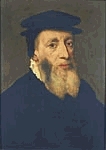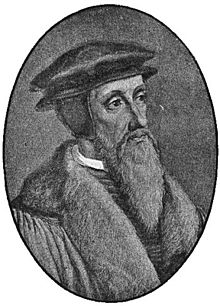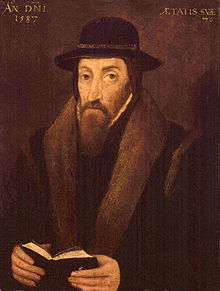Portal:Reformed Christianity/Bio Archive/2007
Portal:Calvinism/Bio Archive/2007/January
---
Portal:Calvinism/Bio Archive/2007/February
---
Portal:Calvinism/Bio Archive/2007/March
---

John Knox (1514?–1572) was a Scottish religious reformer who took the lead in reforming the Church in Scotland along Calvinist lines. He is widely regarded as the father of the Protestant Reformation in Scotland and of the Church of Scotland. He died in Edinburgh on November 24, 1572.
After some time spent as a galley slave, and time ministering in western Europe and Geneva, he returned to Scotland in 1559, and helped organise the first Presbyterian church in the face of armed opposition from the regent who was ruling Scotland at the time. When the Queen returned to the country in her majority, there were many verbal clashes between herself and Knox, which eventually led to his arrest. However, he was acquitted of all charges.
---

John Calvin (July 10, 1509 – May 27, 1564) was a French Protestant theologian during the Protestant Reformation and was a central developer of the system of Christian theology called Calvinism or Reformed theology. After moving to Geneva, he rejected Papal authority, established a new scheme of civic and ecclesiastical governance, and created a central hub from which Reformed theology was propagated.
He is renowned for his teachings and writings (including Institutes of the Christian Religion, one of the Great Books of the Western World) and infamous for his role in the execution of Michael Servetus.
---

John Foxe (1517–April 8, 1587), martyrologist, is remembered as the author of what is popularly known as Foxe's Book of Martyrs. Foxe was born at Boston, in Lincolnshire, England. He entered Oxford at the age of 16, and at the age of 21 became a lecturer there. At 27, he became a Protestant and resigned from Oxford, as this was a difficult position for Protestants at the time. After fluctuations in the politico-religious situation, he fled for Europe at the age of 36. After returning to England more than 5 years later, he published his famous book.
Foxe was one of the earliest students of Anglo-Saxon, and he and Day published an edition of the Saxon gospels under the patronage of Archbishop Parker.
---

John Foxe (1517–April 8, 1587), martyrologist, is remembered as the author of what is popularly known as Foxe's Book of Martyrs. Foxe was born at Boston, in Lincolnshire, England. He entered Oxford at the age of 16, and at the age of 21 became a lecturer there. At 27, he became a Protestant and resigned from Oxford, as this was a difficult position for Protestants at the time. After fluctuations in the politico-religious situation, he fled for Europe at the age of 36. After returning to England more than 5 years later, he published his famous book.
Foxe was one of the earliest students of Anglo-Saxon, and he and Day published an edition of the Saxon gospels under the patronage of Archbishop Parker.
---

John Foxe (1517–April 8, 1587), martyrologist, is remembered as the author of what is popularly known as Foxe's Book of Martyrs. Foxe was born at Boston, in Lincolnshire, England. He entered Oxford at the age of 16, and at the age of 21 became a lecturer there. At 27, he became a Protestant and resigned from Oxford, as this was a difficult position for Protestants at the time. After fluctuations in the politico-religious situation, he fled for Europe at the age of 36. After returning to England more than 5 years later, he published his famous book.
Foxe was one of the earliest students of Anglo-Saxon, and he and Day published an edition of the Saxon gospels under the patronage of Archbishop Parker.
---

John Foxe (1517–April 8, 1587), martyrologist, is remembered as the author of what is popularly known as Foxe's Book of Martyrs. Foxe was born at Boston, in Lincolnshire, England. He entered Oxford at the age of 16, and at the age of 21 became a lecturer there. At 27, he became a Protestant and resigned from Oxford, as this was a difficult position for Protestants at the time. After fluctuations in the politico-religious situation, he fled for Europe at the age of 36. After returning to England more than 5 years later, he published his famous book.
Foxe was one of the earliest students of Anglo-Saxon, and he and Day published an edition of the Saxon gospels under the patronage of Archbishop Parker.
---

Charles Haddon Spurgeon, commonly C.H. Spurgeon, (June 19, 1834 – January 31, 1892) was a British Reformed Baptist preacher who remains highly influential amongst Christians of different denominations, among whom he is still known in various circles as the "Prince of Preachers." He also founded the charity organization now known as Spurgeon's, that works worldwide with families and children. His sermons were translated into many languages in his lifetime. It is known that they were published in Arabic, Armenian, Bengali, Bulgarian, Castilian (for the Argentine Republic), Chinese, Kongo, Czech, Danish, Dutch, Estonian, French, Gaelic, German, Hindi, Hungarian, Italian, Japanese, Kaffir, Karen, Lettish, Maori, Norwegian, Polish, Russian, Serbian, Spanish, Swedish, Syriac, Tamil, Telugu, Urdu, and Welsh, with a few sermons in Moon's and Braille type for the blind.
---
Portal:Calvinism/Bio Archive/2007/November
---
Portal:Calvinism/Bio Archive/2007/December
---
